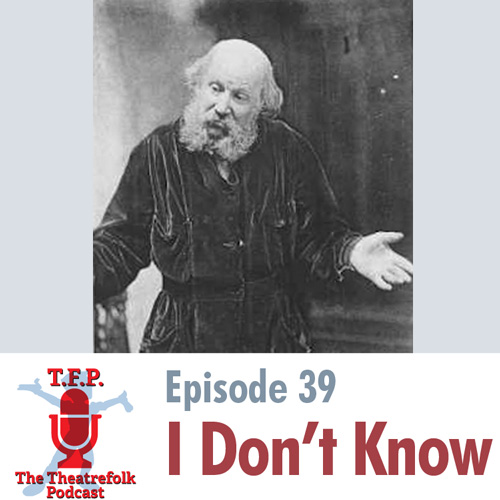Agatha Rex by Lindsay Price is a bold high school take on Antigone - packed with heart, conflict, and a powerhouse ensemble. One girl. One stand. One huge risk. *NEW COMPETITION VERSION AVAILABLE!*
I Don’t Know
Episode 39: I Don’t Know
Whether it’s the answer to an adjudicator’s question, or it’s what an actor says about certain aspects of their character, the words “I don’t know” are not good.
Subscribe to The Theatrefolk Podcast
Episode Transcript
Welcome to TFP, the Theatrefolk podcast. I am Lindsay Price, resident playwright for Theatrefolk. Hello, I hope you’re well. Thanks for listening.
Today I am talking about a completely un-useful sentence “I don’t know.” But first, let’s do some THEATREFOLK NEWS: Okay. This podcast is coming out May 1st. Today, the day I am speaking to you, is not May 1st. Did I tell you I am going away? And so I am and frankly, gosh darn it, it’s so difficult to accumulate news for the future. Waa! First world problems, I can’t do my podcast properly because I’m going on vacation. Waa! So what I wanted to do was I’m going to tell about some of the news plays that I’ve got bubbling in the Theatrefolk test kitchen. It’s a lovely kitchen. It has a gas stove.
So I am working with a school this month to develop a play called Monster Problems that they’re going to perform for their feeder schools. And I am so happy when I can put another middle school out there into the world that has nothing to do with fairy tales. Although I’ll have to say that this one does have a Zombie, Medusa and an Irish Vampire who is little boy crazy and files her nails. Next, I am work-shopping a vignette play, a new vignette play called Neet Teen which is all about, which makes sound, teen life backwards and forwards and inside out. I’m very much attached this to you. I think it’s rather swell. So it would be interesting to see if other people think it’s rather swell.
Sometimes they don’t. You never know; you have to… It’s very difficult to. You get into a trap if you start to go “Oh I’m doing this because it will be popular. I’m doing this because it will sell well. I’m doing this because it’s going to do X, Y and Z.” And really, the only thing you can do is, “I’m putting this out there because I’m proud of it. I’m putting this out there because I like it. I’m putting it out there because I can see that there’s a need and this how I am trying to fill that need with something that I like and that I’m proud of.” It’s the only way you can do it because if you start to guess or you start to try to tell the future. But what’s going to happen with the play, well it just won’t happen and you will get sad, lonely and live with cats. So I’m not going to do that. I’m not going to do that. Excellent English, alright!
The really cool thing for me about Neet Teen is that it really works to extend my comfort zone in terms of writing within a different format, scenes with movement, absurd scenes, and scenes without dialogue at all, monologue, poetry, choral work. So I can’t wait to see how that comes to life, right? And how do the schools respond to working in these formats and do they work onstage the same way that I imagined that they work in my head? Which is not always the case, that’s why getting a script on its fetish it is so, so vital.
And then when I get back from my vacation, BFV back from vacation, I’ll be working on a play called The Gift which is inspired by the short story, the Gift of the Magi. This new holiday full length which isn’t necessarily, specifically Christmas related but it’s very much in the theme of the spirit. The spirit of giving, you know the spirit of the holidays. And it is so close to being done, I can smell it. I can smell this play being so close already. So keep your fingers-crossed on that one and you better cross your toes too. You know if you would, please?
Lastly, where oh where can you find this podcast? We post new episodes every Wednesday at theatrefolk.com and our Facebook page and Twitter. You can find us on the stitcher app, AND you can subscribe to TFP on iTunes. All you have to do is search on the word Theatrefolk.
Episode Thirty-Nine: I don’t know.
I do know that it is episode 39 and I also know how easy it is to say those 3 words “I don’t know”. Sometimes, we say it when we do know the answer, we exactly know the answer to whatever question we’re being asked and we just don’t want to deal with it. We don’t want to make it known that we know. Sometimes it’s so much easier to say “I don’t know”. Sometimes, our brain can’t articulate in answering at the moment. So we just go to that catch all sentence, I don’t know. Sometimes of course, a sentence is just that, a sentence. And we say I don’t know because well, we don’t know.
So there is a festival that I have adjudicated for a couple of times and this festival includes a private feedback session. So for each show, each production they perform and then after their performance, they congregate together. They come into a room and they sit with the adjudicator and chat about the production about what they did and what the adjudicator saw. And it depends on the adjudicator as to the kind of chat that takes place. Some adjudicators lecture, some make it inclusive. These chats can be tremendously nerve-wracking for the students involved. What is the adjudicator going to say behind closed doors? Are they going to be mean? Are they going to say anything constructive? Will they laugh, or say we’re horrible? All those things sort of flash through your mind.
Adjudicators by in large, in general are human, so there many different kinds of adjudicators who follow many different kinds of methods. My personal method is to ask a lot of questions. I find that’s where you get to the heart of what a production intended and whether or not their presentation matched their intention. It’s an interesting inside look. As an adjudicator, you are adjudicating what you see onstage. But I think it’s always good to be in the no. Asking questions is where I find out if a production had to replace their cast a few weeks before and how was that handled on stage. Or if they were working without a staff advisor, that plays apart, or if a student had to step in and stage-manage at the last minute. Asking questions is where I find out how much background work actors have put into their characters and if there was a vision behind the costumes for example that were used.
So if you are involved with any competition that also involves that fun little thing, the private feedback session, here is the biggest tip I can give you. Aside from the tip of don’t treat your adjudicator as the enemy. I know it’s its tense, I know everybody is really, really tense. And they want adjudicator to tell them that they loved everything they saw. And it’s so heartbreaking and demoralizing when that doesn’t happen, but they really are. It’s one person with one opinion. And so to get all tense about whether one person with one opinion likes your work just seems so exhausting, all you can do is present your best work and be happy with your work as opposed to getting all bunched up about whether or not you’re going to win an award or come out on top. You don’t have any control over that. The ranking, the award, the score is out of your hands; putting on a work that you’re proud of – that you can control.
Okay, so another tip. Have an answer for everything. Have a reason for everything that you do, everything that is put on stage, every aspect of your production. The answer to how something came to be onstage in your character in a production should never be “I don’t know.” To have something onstage by accident or just because… It shows as a lack of care in your presentation. And that judgment may be totally false. Maybe you care a lot. Maybe you’re just working with what you have and you have very little. To me as an adjudicator, that’s not a problem. I’m never going to penalize a production with working with what they have, working within their means, doing their best at what they can do. But saying that, presents much different situation to me as an adjudicator than someone saying “I don’t know. I don’t know why the costumes are this way. I don’t know why there was that lighting.” You know what I mean?
The adjudicator, if they’re doing their job correctly, isn’t looking for the Supreme Being. There is only one answer because that’s not what theatre is. There is no such thing as one answer. Certainly there are types of plays where the direction that a play goes based on the intention of the playwright, is going to be narrower than other plays. But the adjudicator is looking for your answer, your choice, where you’re coming from. I personally, I love hearing where student actors and student directors have put their efforts beyond learning the lines and just moving around the stage, what extra did they put in.
A lot of times, when I’m watching a production and I’ll see something on stage and something is not quite right, something doesn’t jive and I want to know… I want to question, I want to know what the intention behind that moment was or what was going on onstage? Give me some feedback. And even though it might not work for me on a personal taste level, the answer given in the adjudication could be so wonderful, so well thought out that I have to give kudos. I cannot help but be overjoyed by it. I love that moment. I love when someone stands up and defends their choice. I love hearing about a well thought out choice regardless of what I… Whether I think they went in a personal taste direction, who cares about that? This is not about personal taste. This about what a production does and brings to the stage.
Here’s a great example. I saw a show where the world of the play was very futuristic. People were brainwashed, robotic. Everybody was dressed identically in shirts that were buttoned right up to the neck and everybody was wearing regulated colors. Everybody marched. It was very set out world. It was a very specific world and there was so much attention paid to the details of this world that when something didn’t fit, something didn’t jive, it really jumped out of me. It’s kind of my job, right? I have to look for that stuff when I adjudicate. I called myself its Queen Picky Mc Pickers.
And so to that end, when I’m watching the show, I really noticed that the risers that the show was using for all their action; the risers where pretty badly scuffed. They looked like risers that had been used a lot over the years, over and over and it looked like they hadn’t been properly prepared for the show. To me, they seemed out of place in a world where everything is neat, where everything is robotic, everything is perfect and pristine. In my head, I thought those risers should have been perfect and pristine to match the world.
And so, I brought up the issue with the risers in the private adjudication. And the director who was a student had a beautiful explanation. She was right on it and she went on and on about how the scuffs were there on purpose because they were representative of how the perfect nature of this particular world was showing its cracks. Soon, it was all going to come falling apart. It was there as jacked position to the costumes and the marching and the way that the characters acted. That is a great answer.
Now, is it a true answer? Did they really discuss this in rehearsal? Did she really stand up and say “No, no, we’re not going to paint the risers because that’s a representation of blah… blah…” right? Well, who knows and who cares? It’s not my job to be cynical about the answers I’m given. My job is to accept the answers that I’m given and it fit with the world of the play. It was a good answer because that’s pretty much basically exactly what did happened. We have this perfect world where the cracks started to show. And further to that, her answer to the question was most definitely not “I don’t know.”
And beyond the world of adjudication, you know when you’re just sitting there, watching the play. When I’m just sitting there watching the play, it’s really not that difficult to tell when I’m watching a show where actors don’t know all the details of their character because they come across as actors playing a part instead of characters living in a world. They’re just saying the lines and moving about the stage and to me, the way to make theatre come alive is to have live three-dimensional characters onstage in their acting, communicating with an audience because that’s how an audience isn’t connecting to the actor. The audience is connecting to the character. So they have to be alive.
And when an actor says “I don’t know” about something to do with their character, then they’re not fully doing their job. And personally, I don’t care if you are in a high school show, a college show, community theatre or professional. You’re on that stage. You accepted a part so you should do your job. You walk to fully play that character. You have to engage with the script. You have to engage with the character and making it your own. And this has nothing to do with changing the script. I’m sure that you know that I know that you know how much I don’t like.
I despise the notion of changing a script because you think you can’t work with it or you think you know something better. But it’s about working with the script, delving into a script, mining it, wringing out every last element from word choice, to pauses, to relationships, to the name of your character. We spend the little time thinking about what characters are called. Spend a little time, do a little research. Is there definition that you can look up? Is there a cultural history that you could look up? If someone asks you what your character’s name means, you should have an answer. And you shouldn’t say “I don’t know”. Why don’t you know?
The more you know, the more you have to work with, the more colors and shades you have to play with, the more fun the character becomes. When I was acting character development and script analysis was always my favorite part. I love the learning the little details, too much though I think. I was more into analysis of it and the performance of it. But, that’s why I’m not acting.
So when you’re in a show, think about what you don’t know about your character. Instead of saying, “Oh well the playwright didn’t give it to me. Oh my character doesn’t have a name so I don’t need to come up with one. Or well, the director isn’t providing me with the information. I guess I don’t have to worry about it”. No way. Do the work yourself. Look at what you’ve been given and fill in the blanks. That’d give you more to work with but fit with the world of the play. Create a character profile.
My favorite character development exercise is to describe the bedroom of your character using the five senses. The bedroom is more often than not such a place of truth for a person. Think about how you keep your bedroom. It’s a place where people sometimes hide themselves or things. It’s where their pain shows, it’s where they bring to life their inner self. Or maybe they’re so trapped inside that… The room is just as bare and sparse and it just shows this horribleness. There’s truth in the bedroom. That’s what I think.
I’m using the five senses just to illuminate and visualize the character in such a vivid way. So really, have I said this enough? Put in the time, do character development work. What are you? Are you a robot? No. Are you just going to stand there onstage and say some lines? Don’t you want to have an effect, a direct effect on the way an audience responds to your work? Don’t you want to give an audience a theatrical, transformative experience? Don’t you want the audience to remember you? Long after they leave, the darkness of the theatre and they go back to the real world. That is that what we all want. The love and adoration of an audience long past the time they see you on that stage. And if you response to all these, Lindsay I really don’t care one way or the other, what are you doing on that stage? What are you there for? Go do something else.
I know, that was a little… I was a little angry. “I don’t know” is the answer that just frustrates me. And I’m no saint, I’ve said it lots of times but this is a situation on the stage that is… We’re trying to bring realism to one artificial moment and that means that, there are answers at your finger tips. And the answer quite often is the one that you come up with and the answer is within your control and when that outcome could be so wonderful if you put in the time. Waa, it just puts a little bee in my bonnet. And I have a lovely bonnet. Trust me.
And that is where we’re going to end. Take care, my friends. Take care.
Music credit: “Ave” by Alex (feat. Morusque) is licensed under a Creative Commons license.



